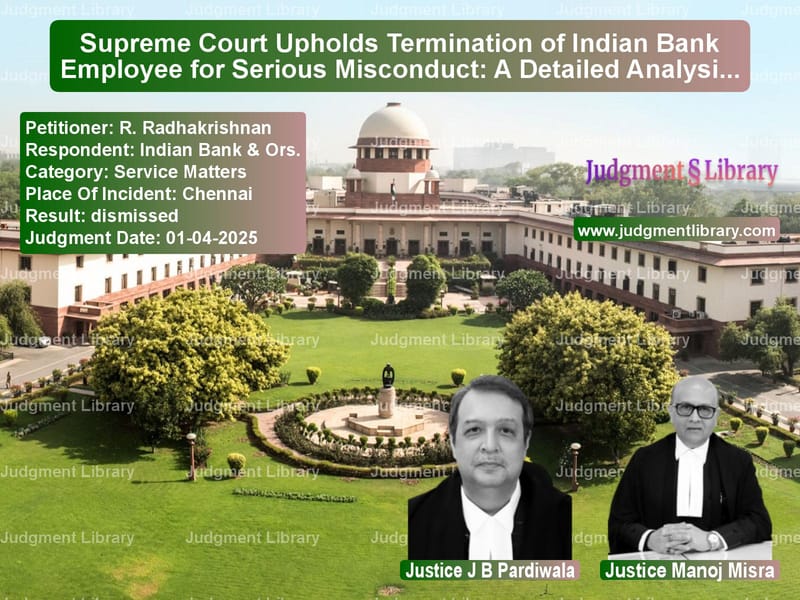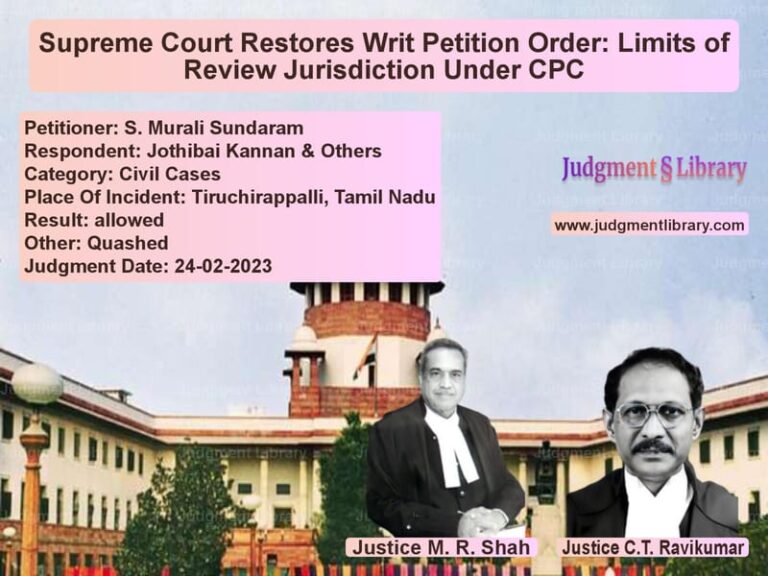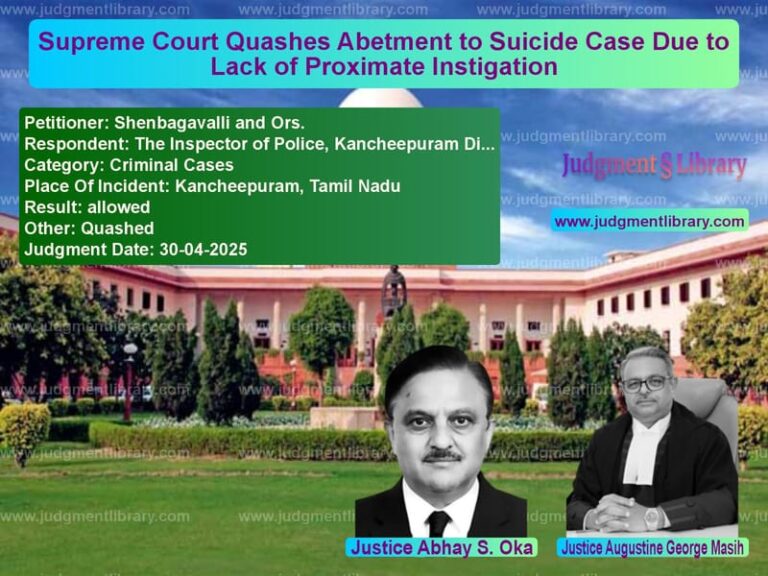Supreme Court Upholds Termination of Indian Bank Employee for Serious Misconduct: A Detailed Analysis
In a career that had spanned nearly two decades, the story of R. Radhakrishnan, a head cashier at Indian Bank, is one of lost trust and consequences. His journey came to an abrupt halt when serious charges of misconduct were leveled against him—accusations that not only shook the foundation of his career but also brought into question the broader principles of trust and accountability in public sector employment. What followed was a series of departmental proceedings, judicial challenges, and eventually, a landmark decision by the Hon’ble Supreme Court of India.
Background of the Case
The petitioner, R. Radhakrishnan, was employed with Indian Bank and held the position of Head Cashier. A departmental inquiry was initiated against him in the year 2002 for allegedly making false entries in the scroll book and manipulating cash balances. He was accused of misappropriating significant amounts by tampering with official bank records. The charges were grave and pointed towards serious professional misconduct that affected the integrity of the bank.
Proceedings in Lower Courts
After an internal inquiry, Radhakrishnan was found guilty and dismissed from service on December 31, 2002. He then approached the Central Government Industrial Tribunal-cum-Labour Court, challenging his termination. Surprisingly, the Tribunal held that while the charges stood proven, the punishment of dismissal was too harsh and directed his reinstatement with continuity of service and back wages. Indian Bank challenged this decision in the High Court of Judicature at Madras.
The High Court overturned the Tribunal’s direction and upheld the original dismissal, observing that the charges constituted serious misconduct and warranted removal from service.
Key Legal Issues
- Whether the punishment of dismissal was proportionate to the misconduct proved?
- Was the Labour Court justified in interfering with the disciplinary authority’s decision despite established misconduct?
- What is the role of judicial review in labour disputes involving proven acts of dishonesty or breach of trust?
Arguments by the Petitioner
The petitioner contended that though there may have been discrepancies in record-keeping, the same did not cause any actual loss to the bank. He argued that the punishment of dismissal was harsh and disproportionate. It was also submitted that his long tenure and satisfactory service record should have been considered while deciding the quantum of punishment.
Arguments by the Respondent
Indian Bank countered that the charges against the petitioner involved manipulation of records, false entries in official scroll books, and clear intent to mislead the management. The gravity of misconduct, they argued, was such that reinstating the employee would erode the bank’s credibility and send the wrong message about accountability in public services.
Supreme Court’s Observation and Judgment
The Supreme Court, comprising Justices J.B. Pardiwala and Manoj Misra, emphasized the role of trust and integrity in public sector employment, especially in banking services. The Court stated:
“When it comes to corruption or corrupt practices, the punishment of dismissal should be the rule and not the exception. A bank employee who manipulates scroll books or tampers with accounting procedures directly undermines the integrity of the institution.”
The Court further held that:
“If a public servant is found guilty of misconduct involving moral turpitude or dishonesty, then no leniency can be shown. Such persons cannot be allowed to continue in service merely because they had put in long years of service.”
Accordingly, the appeal was dismissed, and the dismissal of R. Radhakrishnan was upheld.
Conclusion
This judgment reiterates the zero-tolerance policy of the judiciary towards corruption and dishonest practices, especially in institutions like banks where public trust is paramount. The Court’s firm stance sends a clear message: when the foundational ethics of service are compromised, no mitigating circumstances can override the need for strict disciplinary action.
Impact of the Judgment
This ruling will have far-reaching consequences not only for banking institutions but for all public sector undertakings. It reinforces the principle that trust, once broken, cannot be easily restored in fiduciary services. The verdict is also a reminder for disciplinary authorities that judicial review will not extend to reassessing the gravity of proved misconduct unless the punishment is shockingly disproportionate.
Case Details
- Case Title: R. Radhakrishnan vs. Indian Bank & Ors.
- Civil Appeal No.: 953 of 2024
- Date of Judgment: March 6, 2024
- Coram: Hon’ble Mr. J.B. Pardiwala and Hon’ble Mr. Manoj Misra
- Bench: Division Bench
Petitioner Name: R. Radhakrishnan.Respondent Name: Indian Bank & Ors..Judgment By: Justice J B Pardiwala, Justice Manoj Misra.Place Of Incident: Chennai.Judgment Date: 01-04-2025.
Don’t miss out on the full details! Download the complete judgment in PDF format below and gain valuable insights instantly!
Download Judgment: r.-radhakrishnan-vs-indian-bank-&-ors.-supreme-court-of-india-judgment-dated-01-04-2025.pdf
Directly Download Judgment: Directly download this Judgment
See all petitions in Termination Cases
See all petitions in Disciplinary Proceedings
See all petitions in Public Sector Employees
See all petitions in Employment Disputes
See all petitions in Judgment by J.B. Pardiwala
See all petitions in Judgment by Manoj Misra
See all petitions in dismissed
See all petitions in supreme court of India judgments April 2025
See all petitions in 2025 judgments
See all posts in Service Matters Category
See all allowed petitions in Service Matters Category
See all Dismissed petitions in Service Matters Category
See all partially allowed petitions in Service Matters Category







